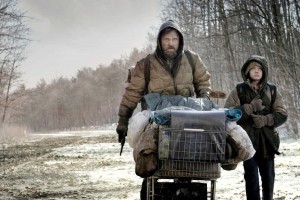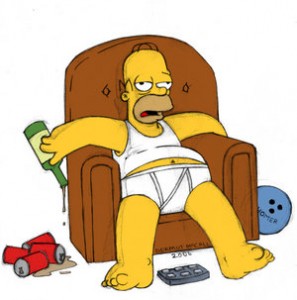This is a guest post by KB Player
Some people at Netmums, which I’m guessing is the Pepsi to Mumsnet’s Coke (irresponsible though it is of me to mention either high-sugar drink when children might be reading), had decided the world might be a better place if they found some way of slagging off The Simpsons. And, while they were at it, The Flintstones and Peppa Pig and The Gruffalo and My Family and Outnumbered. All of those enjoyable entertainments, and My Family, were criticised for their negative depictions of fathers. It was like the RSPCA moaning that Tom and Jerry is an unrepresentative depiction of the behaviour of the domestic cat or the Institute of Hospitality complaining that Fawlty Towers puts people off going to hotels.
It wasn’t just a diatribe written by the website’s staff members: 2,000 parents had been asked their opinions, although I’m not sure in what context and I refuse to find out. But they must’ve been caught in a whingeing mood because they seemed determined to take popular culture personally. Ninety-three per cent thought that the typical comedically bungling TV dad doesn’t accurately reflect what fathers contribute to families in real life. They were not then asked whether or not that’s a problem – whether it is the job of a show such as The Simpsons to accurately reflect family life, whether such shows have ever implied they’re an accurate reflection of anything at all and whether Homer Simpson accurately reflects the number of fingers most fathers have.
That was David Mitchell in last Sunday’s The Observer, being both angry and entertaining.
David Mitchell evidently has his own agenda, because if Homer Simpson is a poor male specimen, the characters Mitchell and Robert Webb play in Peep Show are far worse. First they came for the hapless fathers, then they came for the geekish wankers and the self-deluded druggy losers
The founder of Netsmums, Siobhan Freegard, reassures us that she’s not calling for such shows to be banned (!) but said “Some people claim ‘it’s just a joke. . . but there’s nothing amusing about taking away good role models for young boys.”
This “research” into popular culture’s representation of fathers is a little one sided. Dad might look bad in comedy but in plenty of thrillers and apocalyptic films he is as brave and self-sacrificing as any bull defending his herd. In The Day After Tomorrow the focus of the film was Dad (Dennis Quaid) travelling through a post-calamity USA to rescue his son. In Taken Dad (Liam Neeson) kills and tortures legions of foreigners to rescue his daughter. In the more upmarket The Road Dad (Viggo Mortense) is dedicated to his son beyond the call of helping him with his homework.
Good dad
Bad dad
So popular culture is not so dismissive of Dads as all that. It’s in its comedies that the less godlike Dad appears, which throws some light on how comedy works. It debunks in two ways.
The first way is by giving the jab of rueful knowledge. I doubt young boys see Homer Simpson as a role model. They are more likely to find role models in characters like those created by the first Homer, i.e. Achilles the mighty warrior who is the ancestor of any fighting man down to James Bond and further on – men without domestic responsibilities. Homer Simpson is not a role model but a portent. He’s got a crap job, a family and a paunch – something the average boy will have in about 30 years time, whereas the chances that he will have a string of young beauties to shag and a licence to kill are slim.
It was a Very Good Year by Frank Sinatra is one of my favourite songs. The hero of the tale is an older boy’s fantasy, the suave fellow who is a connoisseur of the women as he moves from the small town girls when he was seventeen to blue-blooded girls in limousines in his thirties.
And here’s Homer Simpson’s take on it:-
When I was seventeen,
I drank some very good beer,
I drank some very good beer I purchased with a fake ID,
My name was Brian McGee,
I stayed up listening to Queen,
When I was seventeen.
Most men’s memories of their lives will be closer to Homer’s than Frank’s.
The second aspect of comedy is that it is the “aargh!!” texted to your colleague while the Department Head is preaching to you about how the firm especially needs your hard work, even while you return to your desk to put in the extra hours. If you find Homer Simpson funny – and I’ve seen polls which have declared him the funniest television character of all time – it’s not because you think the average father is like him. Quite the contrary.
In fact of the 2150 parents questioned on how Homer Simpson et al unfairly portray fatherhood “three quarters said the standing of fathers had improved in society and men were more hands-on compared to a generation ago. Nearly nine out of 10 fathers said they sought to be a better parent than their own dad.”
So here’s some reassurance to those nine out of 10 fathers. You’re trying to be good fathers, and good for you. The world needs patient, kind parents. But being patient and kind is taxing so if you can’t take a break from it, enjoy watching some yellow fellow doing it on your behalf.
George Orwell said it best in The Art of Donald McGill:-
If you look into your own mind, which are you, Don Quixote or Sancho Panza? Almost certainly you are both. There is one part of you that wishes to be a hero or a saint, but another part of you is a little fat man who sees very clearly the advantages of staying alive. He is your unofficial self, the voice of the belly protesting against the soul. . .
Codes of law and morals, or religious systems, never have much room in them for a humorous view of life . . A dirty joke is not, of course, a serious attack upon morality, but a sort of mental rebellion. . .So also with all other jokes, which always centre round cowardice, laziness, dishonesty or some other quality which society cannot afford to encourage,. . .When it comes to the pinch, human beings are heroic. Women face childbed and the scrubbing brush, revolutionaries keep their mouths shut in the torture chamber, battleships go down with their guns still firing when their decks are awash. It is only that the other element in man, the lazy, cowardly, debt-bilking adulterer who is inside all of us, can never be suppressed altogether and needs a hearing occasionally.
I would guess – and I ask blokes and/or dads reading this to confirm – that when their duties call them to attend to one of their spawn’s needs, whether earning the wherewithal to buy them shoes or helping them put those shoes on the right feet, that a tiny part of the bloke would like to be a slack, skiving sod, with a beer in one hand, a snack in the other and the telly full frontal .




